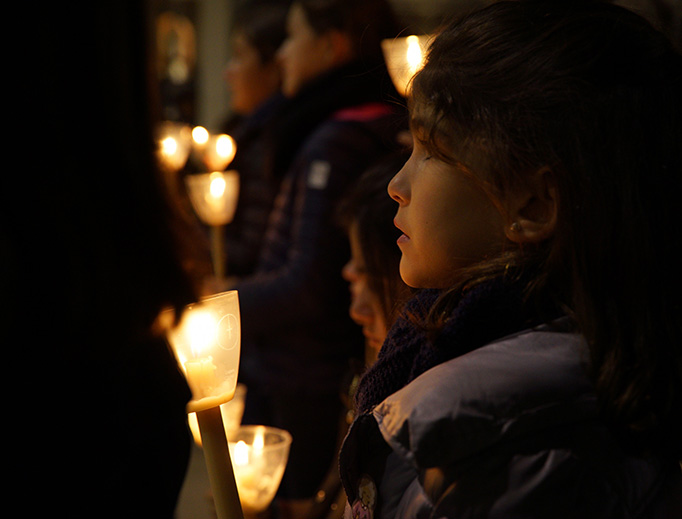Why Do We Pray?
We pray because God is real.

Nearly everyone in my social media feeds is sharing coronavirus-related memes and articles with varying levels of anxiety, poignance and humor. But some, I imagine, are wondering what’s up with all these priests flying the Blessed Sacrament around in an airplane and people lining up in droves for drive-through confessions. And what was the pope doing in the rain? Not everyone shares my faith, and I imagine there’s an unspoken question: Why do we pray?
It’s not out of panic: We’ve been praying for a lot longer than this virus has been around. For centuries, we’ve been kneeling before the Eucharist; saying Rosaries alone or with our families, friends, parishes, and even larger groups; confessing our sins and receiving absolution; finding silence and lifting our minds and hearts to God. This is an ordinary part of life for us; the only change is that we’re figuring out how to do it amid quarantines and heightened anxiety—and we also have Instagram.
Why do we pray?
I could wax poetic about the human spirit. We’ve seen Italians singing from balconies, intuitively refusing to believe that they are mere animals, content to stay at home, snoring in the sunshine like my dog does all day. Remaining in their home quarantines, they seek beauty, solidarity, freedom—something that can’t be quantified. Many of us recognize that desire in ourselves, even without a crisis. We want something bigger, greater, more profound than the material world. We gaze at a sunset, and while we fully believe what scientists tell us about water droplets and light waves and the human eye, we don’t only see light and color. We see beauty. A scientist can explain why the sky is pink and orange (and this is important), but why is it beautiful? Why am I speechless? What is stirring in my heart? Prayer, I could say, is a response to this stirring that we all feel deep within us.
I wouldn’t be wrong to say that. But that’s not really why we pray.
We pray because God is real.
* * * * * * *
We have to ask then—because this is a common misunderstanding—who is this God who is real?
Our religion distinguishes between faith and superstition. Faith is like trusting that when your husband is working late, he is actually working late and not sleeping with his secretary, because you know him and you know that he is trustworthy. Superstition is thinking that you can control his fidelity by arranging the furniture in a certain way.
What does this mean about God? God is not some kind of cosmic vending machine where we can guarantee a specific result if only we push the right buttons. He is also not some kind of all-powerful robot who can be conned into doing what we want. We understand this from the teachings of our faith, but also from our experience of the obvious. Rather, God is personal and knowable.
Who is God? God is our Father and he loves us. We thank him for things and we ask him for things. There is a kind of confidence and trust that we try to have when we pray, because remember, God is not a vending machine; he is personal. Trust is born of love, and love only exists in relationship, and relationships take time and effort. That time and effort, broadly speaking, is what we call prayer. (This is why we pray.) Like anything, prayer can be learned and practiced and improved; like any relationship, more time (and better time) normally leads to a closer connection.
If we trust God, what do we trust him to do? We can be confident that he listens, that his love is real, and that he will respond with love. What that means materially in any specific case, I can’t say; it’s his decision, not mine. If this sounds like a cop-out answer intended to side-step the obvious question of why there is suffering in the world if God really loves us, I understand. It’s difficult (and not always responsible) to trust someone you don’t know. But God is real, and he is personal, and he is knowable. When you intentionally foster a relationship with him through prayer (and this is why we pray), you grow to know him more, and you begin to catch glimpses of his love even in the darkest periods of your life. This isn’t something I can explain in a paragraph or an essay; I can only say that it is true in my experience and the experience of many, many others. Love has a logic that doesn’t fit nicely into a dataset, but that doesn’t make it less true or real.
* * * * * * *
So, why do we pray?
We don’t pray out of a naive belief that our rosary beads will scare away a virus through magic; we don’t imagine we can pull strings and control a remote force somewhere in the universe.
We pray because we know that God’s love is real and perfect and infinite; we pray to increase our capacity to receive his love, to grow closer to the only one who loves us perfectly. We pray because the more we experience his love, the more of it we want. We pray because this love never fails, even when everything else in the world eventually does.
We pray because God is real.
Mary C. Tillotson holds an MA in TESOL from Eastern Michigan University and a BA in English literature from Hillsdale College. She lives in Michigan with her family.
- Keywords:
- coronavirus
- prayer

















